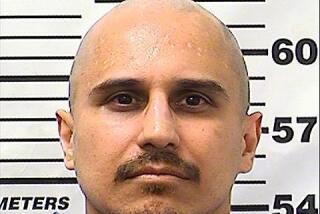Hearing Begins for Soldier in Slayings
- Share via
CAMP ARIFJAN, Kuwait — A pretrial investigation opened Monday for a U.S. Army sergeant charged with killing two superiors in Iraq, and a witness testified that the defendant had said he wanted to kill one of the victims.
Staff Sgt. Alberto B. Martinez of Troy, N.Y., faces murder charges in the June 7 killing of Capt. Phillip Esposito and Lt. Louis E. Allen in an explosion at Forward Operating Base Danger near Tikrit.
For the record:
12:00 a.m. Nov. 3, 2005 For The Record
Los Angeles Times Thursday November 03, 2005 Home Edition Main News Part A Page 2 National Desk 1 inches; 55 words Type of Material: Correction
Soldier’s hearing -- A photo caption in Section A on Tuesday said Army Staff Sgt. Alberto B. Martinez was arriving at his pretrial hearing. Martinez, who is charged with murdering two superiors in Iraq, was shown in silhouette in the background of the photograph. The identity of the person in the foreground is not known.
It is believed to be a rare case of an American soldier in Iraq being accused of “fragging.” Fragging is a Vietnam War-era term used to refer to soldiers killing their superiors.
The prosecutor, Capt. Adam Siple, asked for a recommendation to proceed to court-martial. Martinez’s defense counsel argued no evidence was presented.
After nine witnesses testified, the hearing adjourned until today, when investigating officer Col. Patrick Reinert will decide whether to recommend a court-martial.
One witness, Capt. Carl Prober, said Martinez told him twice that he hated Esposito -- once in September 2004 and again in May. In the second instance, Martinez said “specifically, ‘I hate [Esposito] and I’m going to frag [him],’ ” Prober testified.
Prober did not say why Martinez, 37, said he hated Esposito.
Esposito, 30, of Suffern, N.Y., and Allen, 34, of Milford, Pa., were killed by a blast in Esposito’s office in a former palace of Saddam Hussein that was being used as a base. Their deaths were initially thought to have resulted from a mortar round that struck a window.
Senior Master Sgt. Kevin Fitzgerald, an expert on explosives, testified that the blast was caused by a Claymore antipersonnel mine and possibly three grenades. Surgeon Col. Joan Sullivan told the tribunal that the men’s injuries were not consistent with wounds caused by a mortar round or rocket.
The victims’ widows attended the hearings after the Army agreed to fly them to Camp Arifjan, 35 miles south of Kuwait City, for the sessions.
The Tikrit case is the second known incident in which a U.S. soldier has been charged with killing his comrades during the Iraq war.
In April, a sergeant in the Army’s 101st Airborne Division was convicted of premeditated murder and attempted murder for a grenade and rifle attack that killed two officers and wounded 14 soldiers in Kuwait during the opening days of the U.S.-led invasion of Iraq in March 2003.
Hasan Akbar, a 34-year-old Muslim who was sentenced to death, told investigators that he staged the attack because he was upset that American troops would kill his fellow Muslims.
Fragging incidents were reported during the Vietnam War, particularly in the late 1960s as the strains grew on a draftee Army waging an unpopular war. Soldiers feeling hassled or unnecessarily put in harm’s way by their commanders used fragmentation grenades in hundreds of incidents.
More to Read
Sign up for Essential California
The most important California stories and recommendations in your inbox every morning.
You may occasionally receive promotional content from the Los Angeles Times.









